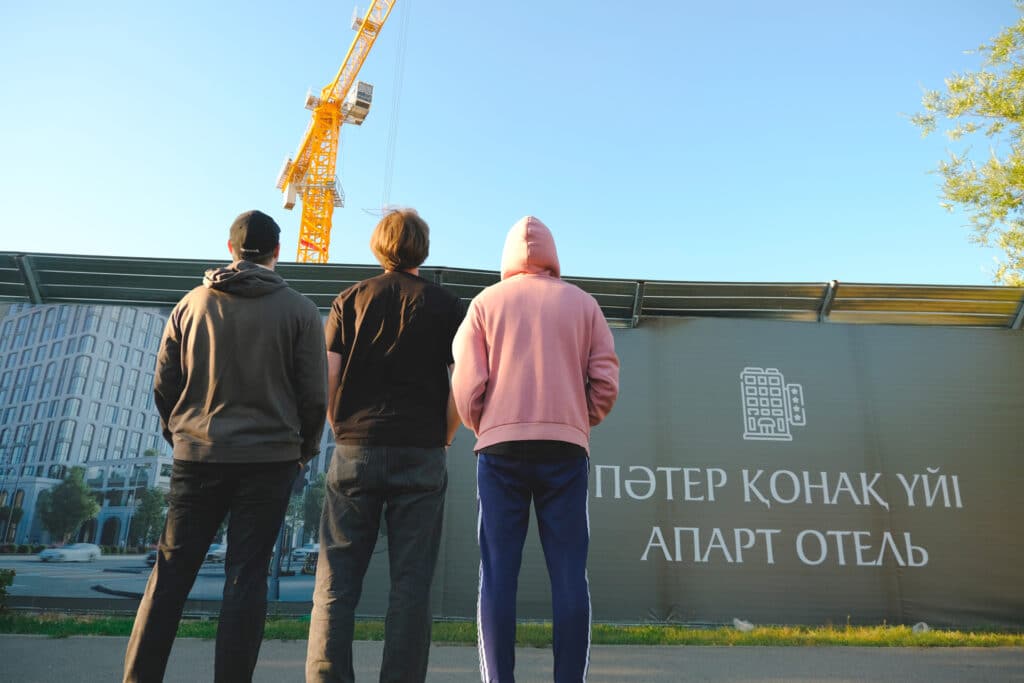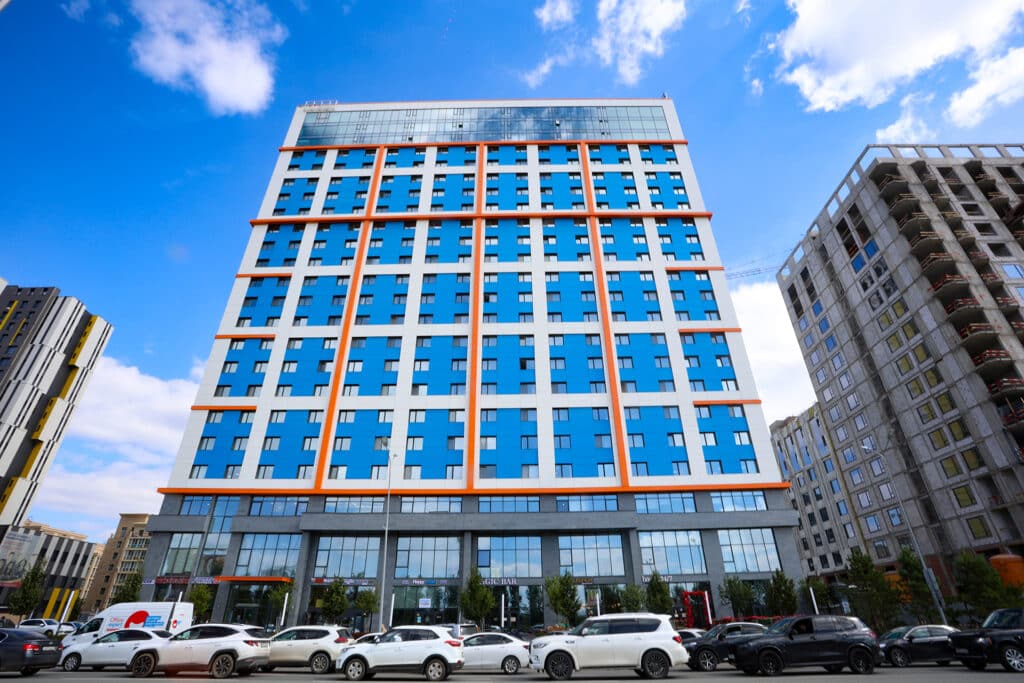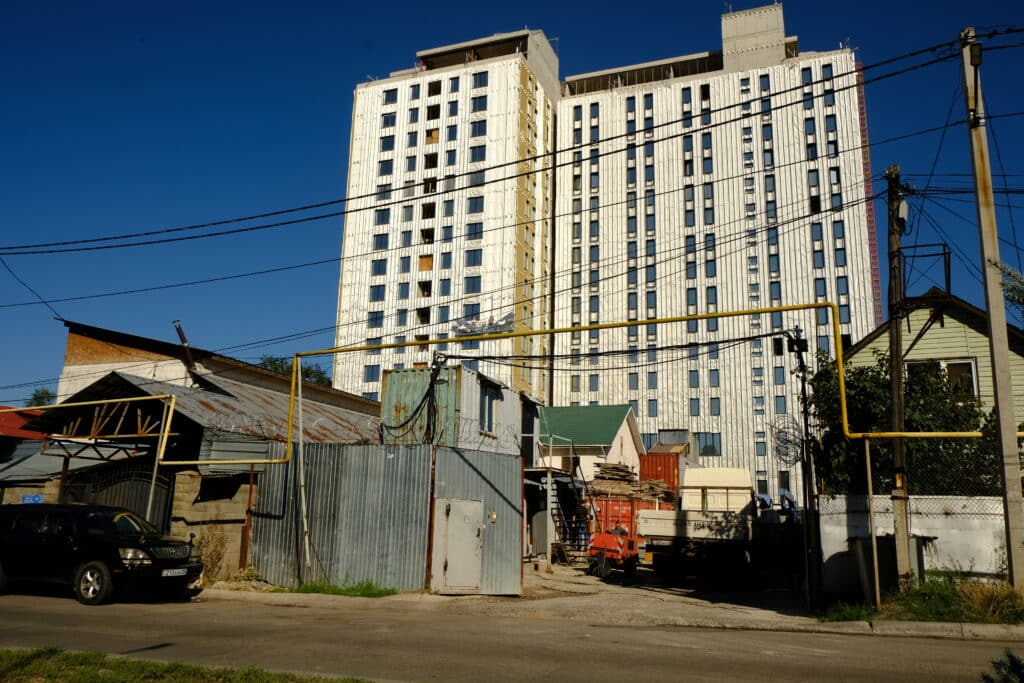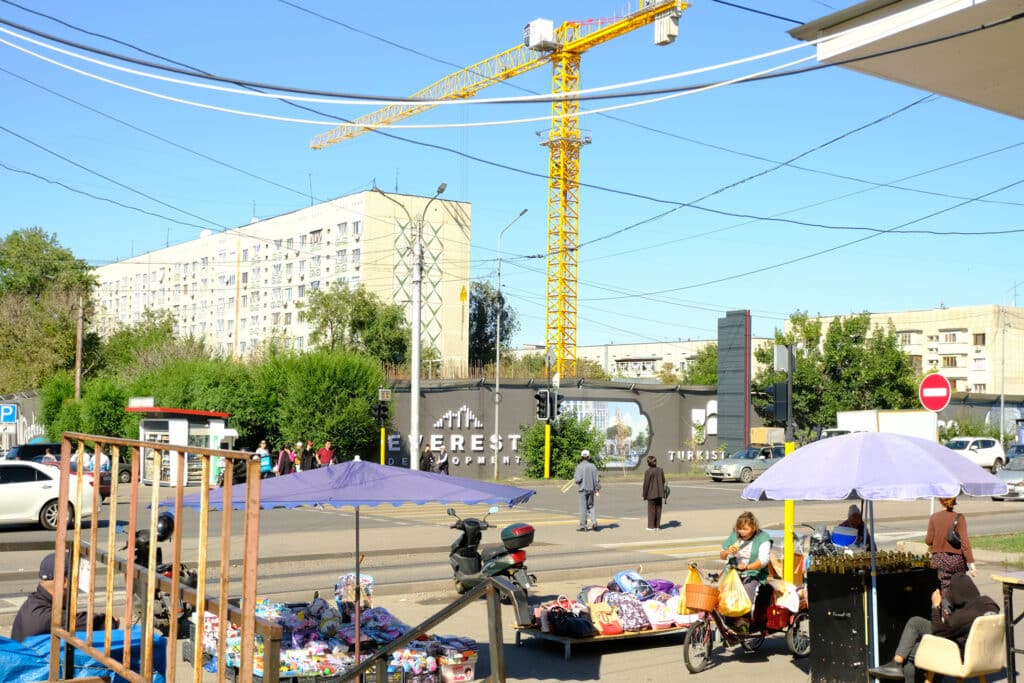As of Sept. 1, the YE’S Astana apartment hotel in Kazakhstan’s capital has been rebranded as TÖR’RE Astana, signaling the developer’s decision to reclaim control of the high-demand rental space. In Almaty, developers and investors are also showing rising interest in rental housing with kitchens. Over the next year, at least four residential apartment projects, totaling 1,100 rooms, are expected to enter the market.

Demand for residential hotels is growing in Kazakhstan’s major cities, driven by a recovery in tourism and a shortage of vacant rooms.
«The apartment hotel segment is showing growth in both demand and supply. For potential investors, investing in extended-stay hotels provides a simple and accessible way into commercial real estate, offering a relatively low entry point and stable cash flow,» said Maksim Nikityuk, head of consulting and valuation at Colliers Kazakhstan.
Natalia Skalandis, managing partner at Zenith Property Management, a Russian company specializing in apartment hotel management, views investing in apartment hotels as a viable alternative to buying a one- or two-bedroom apartment. She highlights that it offers a more convenient way to generate income from real estate, relieving investors of management concerns.
Evgeny Grikhanov, Chief Executive Officer (CEO) at Commonwealth Partnership Uzbekistan (CMWP), an international consulting company, also sees potential for growth in this segment, particularly in Almaty.
«Almaty is the most promising region due to its high concentration of business activity and the demand for rental housing for various periods. Corporations renting housing for their employees in Almaty can create strong profitability for the owners of such apartments while providing a quality living environment for their workers. There’s also demand for these projects among students, as they offer a more expensive but higher-quality alternative to hostels.»
Currently, the domestic market has only one operating apartment hotel with 368 rooms in downtown Astana. The hotel is currently transitioning to new management. Meanwhile, in Almaty, four projects from two developers — The Ultimate Visionary Group and Everest Development — totaling 1,125 rooms are expected to enter the market by 2026. Additionally, several other companies, including Russia’s Becar Asset Management, are exploring partnerships and considering the construction of residential hotels.

Highly valued square meters
«Unfortunately, booking accommodation at YE’S Astana is currently unavailable on our website,» reported booking.com, with the last review of the apartments dated July 2024.
In August 2024, Kazakhstan’s first apartment hotel, which opened in 2021, ceased operating under the YE’S brand, part of Russia’s Pioneer group of companies. The CEO of the YE’S hotel chain stated that the company withdrew from managing YE’S Astana because the developer failed to meet the agreed-upon terms. After three years of operation, the developer opted to reclaim the premises, including technical, office and public spaces, for its management, despite the contract’s stipulation that part of the apartment hotel would be permanently transferred to YE’S.
The developer and prime contractor of the project, QZ Apartments — founded by Yerbolat Zhaxylykov and Edgar Salduzi, who purchased the Almaty Heavy Machine Building Plant (AHMBP) from the Nazarbayev family — has already taken over the facility’s management. The hotel, now listed on HeadHunter under its new name, TÖR’RE Astana, is seeking an administrator. The job description states: «The TÖR’RE group of companies represents a unified ecosystem in Kazakhstan’s hospitality industry. We operate two hotels under the Wyndham brand: TÖR’RE Astana, a Trademark Collection by Wyndham — the first representative of the brand across the Commonwealth of Independent States (CIS) — and Wyndham Residences Aqkol, a country wellness hotel.»
A good start?
A standard unit at the capital’s apartment hotel now costs between $48 and $56 per night, which is relatively low for a four-star hotel. According to the Bureau of National Statistics of Kazakhstan (BNS), the average cost of a room in a four-star hotel in Astana during the first quarter (Q1) of 2024 was $65 per night, while a room in a three-star hotel averaged $44.
Given these rates, it’s expected that the hotel, located in the center of the capital, will maintain a high occupancy rate. The former management company for YE’S cites impressive utilization rates: 81.5% in 2023 and 85% in Q1 and Q2 of 2024. These figures stand out, especially given that the average occupancy rate for three-star and four-star hotels in Astana last year barely exceeded 50% and has been below 35% this year.
However, investors often view occupancy rates as only one factor among many in evaluating such projects.
«High occupancy can indicate that rates are too low and vice versa. It’s possible to maintain a 65% occupancy rate with very high room rates,» explained Skalandis. «The more important indicators are gross income and profitability per room.»
As for YE’S profitability, its press service’s only comment was that payments to investors in 2023 exceeded $1 million. The company did not disclose gross income or yield per room, citing the confidentiality of the information. However, the press service noted that relationships with investors remained «positive and constructive» after YE’S withdrew from the project.
«Together with the current owners, we are discussing new development opportunities and offering cooperation options if they decide to sell their asset in Kazakhstan,» YE’S representatives stated.
Commercial real estate market participants interviewed by Kursiv agree that the first apartment hotel project in Kazakhstan can hardly be considered a success.
«Differences in business approaches between the Kazakhstani developer and the Russian management company were apparent from the start. Initially, the delay in the hotel’s launch dates raised concerns for the Russian partner. Once operations began, there were ongoing disagreements over management and organizational strategies. During the second phase of the project, the developer began looking for new partners to handle the property,» one expert said on condition of anonymity.
«Several mistakes were made in the project’s implementation. The main issue was the insufficient attention to local mentality and values. The project was too generic and standard. Given the unique aspects of the country and the importance of hospitality, the project should have been more distinctive. Although it was labeled as a four-star hotel, guests perceived it more as a three-star venue. Perception is a crucial factor,» added another expert.
This unfortunate experience has somewhat dampened interest among both investors and Kazakhstani developers in apartment hotels. However, the segment remains attractive.
«It is a promising sector. Investors are interested in this segment,» confirmed Evgeniy Dolbilin, partner at Scot Holland / CBRE in Central Asia and Kazakhstan.
Evgeny Grikhanov notes that although the residential hotel market in Kazakhstan is still progressing slowly, there is, and will continue to be, demand for such facilities.
Shared apartments
The Ultimate Visionary Group, an Almaty-based company, demonstrates that the apartment hotel sector remains appealing to developers.
Last year, the company, which had no prior experience in such projects, announced the construction of its first extended-stay hotel in Almaty — Parkside Living — with 360 rooms in the Medeu district, near the Central Recreation Park. Additionally, the company plans to build two more hotels in the Almaly (340 rooms) and Bostandyk (300 rooms) districts of Almaty by 2026, for which it has already acquired land. Following these projects, The Ultimate Visionary Group’s head, Dmitry Laktyushin, revealed that the company intends to expand to Astana, Shymkent and potentially beyond Kazakhstan. As part of this expansion, the developer plans to partner with «one of the hotel chains operating under global standards,» with the name to be announced this fall.
The Parkside Living project is currently in the finishing stages, while the Mega View Living project in the Almaly district, next to Mega Park, is still in the excavation stage and awaiting the start of sales.

Parkside Living is set to begin welcoming visitors in a test mode by the end of 2024, with full operations expected to start by spring, three months later than originally planned. The delays are attributed to legal claims from Almaty’s Department of Urban Planning Control regarding construction work conducted in 2023 without the necessary permits. Additionally, the developer decided to replace the installed gypsum plasterboard partitions with tongue-and-groove boards to improve fire safety.
According to Laktyushin, about 90% of the apartments in the residential complex have been sold, with 40% of the space retained by the developer. The Ultimate Visionary Group has decided to sell units on the upper floors (parts of the 14th and 15th floors) to investors, subdividing them into one-to-ten-square-meter spaces with guaranteed profitability.
«For one million tenge [approximately $2,000], you can own a one-square-meter space in a specific suite, complete with a registration certificate issued by the Bureau of Technical Inventory (BTI). There may be up to 25 co-owners of this apartment. We guarantee to rent your ‘square-meter space’ for five years with an annual yield of 19.6%, with the possibility of indexation linked to the daily room rate. After five years, we will either buy it back or extend the contract. This offers an alternative to placing money in a bank deposit,» Laktyushin explained to potential investors.
Your share of the pie
If the cost of a shared apartment is $2,000 per square meter, purchasing an entire unit (about 10 units still available) will be more expensive — ranging from $2,700 to $2,800 per square meter ($62,300 for a 23-square-meter Smart unit or $160,700 for a 57-square-meter Suite). The developer pointed out that pricing is dynamic, with prices increasing by two percent after every 10 rooms sold. Consequently, since sales began, the cost of Smart units has nearly doubled — from $33,700 to the current $62,300.
For pre-construction buyers, the developer claimed high annual profitability — ranging from 28% to 52% — and a short payback period: 3.5 years at 60% occupancy and 1.9 years at 110% occupancy (when clients stay for a few hours but pay for a full day). However, the developer didn’t clarify that these figures exclude the construction time. For those joining the project now, the projected yield is nearly halved, ranging from 15% to 28%, with a longer payback period of 6.5 to 3.6 years at 60% and 110% occupancy, respectively.
Additionally, the developer’s financial models only consider the 30% commission of the management company and fail to mention other costs, such as utilities (about 10%), taxes and more.
The developer also specifies that the team uses an individual method of occupancy calculation, based on the actual occupancy of specific units, rather than an endpoint method, which averages the occupancy across all units. Since part of the rental space remains with the developer and part is sold with a «guaranteed income,» private unit owners may find that guest occupancy might not be prioritized in their favor.
New player
In early July, another company, Everest Development, announced a new apartment hotel project in Almaty — Turkistan Apartments, located at the intersection of Pushkin and Makatayev streets. The foundation has already been poured for the upcoming 12-story block, designed for 125 units, and frame construction has begun. Nearby, a 16-story hotel block is also under construction, currently at the excavation stage. The developer expects to complete the project by the end of 2025.

While Everest Development has no prior experience with aparthotels featuring multiple owners, the developer has made efforts to address the shortcomings of earlier newcomers in the market. The project is positioned as authentic and prestigious, with the international hotel chain Radisson serving as both operator and consultant, involved from concept to layout design.
At the start of sales, the price per square meter begins at $1,300 (with 100% prepayment) for units measuring 47 square meters ($63,500 per unit). Smaller units, measuring 32 square meters, are priced higher at $1,400 per square meter ($47,300 per unit).
The developer’s financial model projects a 60% occupancy rate in the first year of operation, increasing to 75% within ten years. The cost of rent per night starts at a moderate $54 (for a 32-square-meter unit) and is expected to rise to $77 over ten years. Based on this financial model, factoring in service and management costs (with the management company taking a 30% fee), the payback period for the project is estimated to be 5.3 years.
Based on sales activity, the project appears attractive to private investors. According to the sales department, by September — just two months after sales began — a quarter of the units had been sold, with an additional 20% currently booked.
Detailed analysis
Despite the outward appeal of the residential hotel segment, both developers and private investors need to pay close attention to the details to avoid disappointment later on.
«It’s essential to visit completed facilities, conduct a thorough interview with the operator and ask all questions openly. Discuss the financial model in detail, build a cash flow plan and clarify the conceptual structure — how it’s formed and what it consists of,» advised Skalandis.
The expert estimates that the projected profitability of a three- to four-star aparthotel with 150 to 250 rooms in Kazakhstan is currently around 12% to 13%. To achieve this, investors should aim to capture 50% to 55% of the gross income from each room. When calculating room utilization, it’s important to note that in the first year of operation — while the operator establishes its reputation and client base — normal occupancy is expected to be 50% to 55%. In the second year, it typically increases to 55% to 60%, and by the third year, up to 75%.
«On average, 80% is considered a good occupancy rate for the entire payback period, as it balances room depreciation and maintains a healthy ADR (average daily rate),» said the managing partner of Zenith Property Management. «The payback period for such projects is around seven years. However, for this to be achieved, an aparthotel must have a strong, commercially viable concept, a well-defined guest profile, desirable features (such as location, quality or theme) and a guaranteed, pre-planned flow of guests.»
Maksim Nikityuk, head of consulting and valuation at Colliers Kazakhstan, estimates the typical payback period for aparthotels in Kazakhstan to be 10 to 12 years. Shorter payback periods and higher profitability, as shown by developers to buyers, do not guarantee results, even with a reputable hotel operator managing the property.
«…Radisson is an internationally recognized brand known for its high service levels. However, Radisson primarily specializes in hotels with one or two owners. When it comes to residential investment hotels, there are specific challenges. Therefore, investors may and should have concerns. Lack of experience often brings risks, uncertainty and potentially unrealistic expectations,» cautioned Skalandis.
Additionally, experience indicates that a developer’s partnership agreement with a hotel operator during the design or construction phase of an aparthotel does not guarantee that the agreement will remain in effect when the project launches or throughout its operation. For example, there was a breakdown in relations between a Moscow developer and YE’S, as well as a more recent situation in neighboring Russia, where many international brands rapidly exited the country.
Furthermore, private investors should be aware that they are co-investors in these projects, which exposes them to business risks such as extended construction timelines or permit issues. The Ultimate Visionary Group clarifies this in their agreement with investors: «Legal relations are not governed by Kazakhstan’s laws ‘On Equity Participation in Housing Construction,’ ‘On Housing Relations’ or the order by the Ministry of Industry and Infrastructure Development ‘On Approval of the Rules for Organizing the Activities of the Housing and Construction Cooperative (HCC) and Payment of Share Contributions by Members of the Housing and Construction Cooperative […].’» Additionally, Everest Development handles preliminary contracts with clients through its representative, Upstate LLP. This form of agreement does not protect the buyer from development risks. Additionally, the contract includes a 10% penalty for termination, regardless of who initiates it.
«I’m confident that there are developers in Kazakhstan capable of delivering high-quality projects. The market is ready. However, it’s crucial to involve professional companies at the conceptual stage to support the project through every phase. Once the right product is properly developed and launched, investors and successful projects will follow,» Skalandis concluded.

